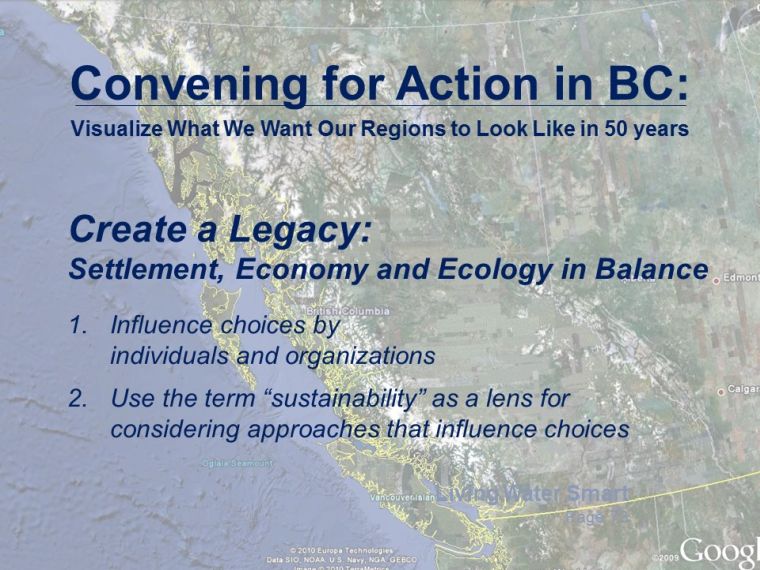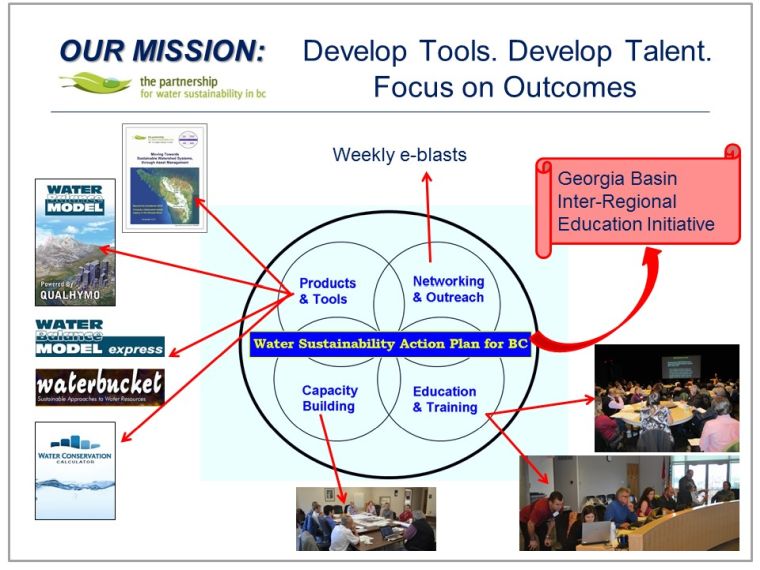“Released in March 2018, ‘Our Story’ provides a comprehensive picture of the integrated program that the Partnership is delivering under the umbrella of the Water Sustainability Action Plan,” stated Mike Tanner, a founding Director of British Columbia’s Partnership for Water Sustainability
Note to Reader:
In March 2018, the Partnership for Water Sustainability in British Columbia released Our Story. This provides a comprehensive picture of the integrated program that the Partnership is delivering under the umbrella of the Water Sustainability Action Plan for BC.
Released by the provincial government in February 2004, the Action Plan provides a partnership umbrella for advancing on-the-ground initiatives in the local government setting.

About the Partnership / Action Plan
The Partnership for Water Sustainability in BC (the Partnership) was incorporated as a not-for-profit society in 2010 to promote and advance the protection and management of natural and engineered water resources in British Columbia.
Implementation of the Action Plan
“The Partnership’s Leadership Team includes engineers and geoscientists experienced within the private and public sector, as well as community engagement through stewardship,” explains Mike Tanner, a founding Director. He retired as a Senior Manager with BC Hydro’s Power Smart  program.
program.
“We are working with practitioners involved in water resources functions to foster integrated protection and management strategies through enhancement of practitioner expertise (i.e. “developing talent”), and through further evolution and delivery of program elements developed under the umbrella of the Water Sustainability Action Plan (the Plan) for British Columbia.
Whole-System, Water Balance Appproach
“The purpose of the Action Plan is to build practitioner capacity to explore new ideas so that those in the local government setting whose decisions influence community and infrastructure design can build greener and more water resilient communities in British Columbia.
“In the early years, initiatives were inspired by and built on the conceptual foundation provided by A Water Conservation Strategy for British Columbia, released in 1998. Ian McHarg’s “Design with Nature” vision has influenced Action Plan implementation. The desired outcome is to achieve settlement, economy and ecology in balance.
“Under the Action Plan umbrella, the Partnership collaborates with government and others to develop methodologies, tools and resources to support implementation of the Whole-System, Water Balance approach to land use, infrastructure servicing and asset management and as a result, the protection of natural systems.
“While the Action Plan program has ongoing since 2004, the focus since 2012 has been on an initiative branded as Sustainable Watershed Systems through Asset Management. The integrated program supports initiative implementation by participating local governments.
“We believe that by providing education, research, technical services and tools, we can, through collaboration and innovation, help communities both reduce the increased demand for water and, protect stream health from the adverse consequences of land development practices.”
To Learn More:
Download a copy of The Partnership for Water Sustainability in British Columbia – Our Story (March 2018).

The Partnership, Looking Forward
“ There is no question that water resiliency will be the focus of the future and will be an essential condition to maintain a stable society and an effective economy, as it is a given that water is truly the connector of all activities on earth. This realization demands innovation and creative partnerships, heretofore not considered possible,” states Eric Bonham, a founding member of the Partnership. Prior to retirement from government, he was a Director in two provincial ministries – Environment and Municipal Affairs.
There is no question that water resiliency will be the focus of the future and will be an essential condition to maintain a stable society and an effective economy, as it is a given that water is truly the connector of all activities on earth. This realization demands innovation and creative partnerships, heretofore not considered possible,” states Eric Bonham, a founding member of the Partnership. Prior to retirement from government, he was a Director in two provincial ministries – Environment and Municipal Affairs.
From Awareness to Action
“It is against this backdrop that the Partnership was formed in 2010 with a specific focus of promoting the protection and management of natural and engineering water resources in British Columbia,” continues Eric Bonham.
“This has been achieved through a combination of strategies, including, partnerships, education, innovation, networking, outreach, capacity building and the provision of products and tools. This translates to action on the ground and an effective, as well as a forward thinking approach to water management in British Columbia and beyond.”
Collaborate, Collaborate, Collaborate
“In essence, central to the success of the Partnership has been the collaboration developed with provincial, regional, local levels of government and the community, through the provision of leadership, innovation and expertise, ‘stepping outside the box’ and ‘looking outside the pipe’ for solutions that address the reality of climate change and its impact on water management,” explains Eric Bonham
“This is a major shift from addressing water management through an infrastructure response alone, to recognizing the role of natural systems in achieving water resiliency and stability, given the backdrop of an unpredictable water cycle.”
Provincial Influence
“By way of information, the Partnership members have also been involved in the development of many of the key water policy initiatives in BC including the Water Conservation Strategy of BC, the Water Sustainable Action Plan for BC, the new Water Sustainability Act, and the Stormwater Planning, A Guidebook for BC, as well as hosting or co-sponsoring almost a 100 workshops including a number of conferences.”
Vision + Pragmatism
“Indeed future planners, engineers, scientists, politicians and citizens alike will be called upon to demonstrate both vision and pragmatism, working as a team towards consensus, commitment and collaboration for the common good. Such collaboration is essential and must cross all political and community boundaries given that climate change is no respecter of such creations. This premise is fundamental and the basis for each of the Partnership initiatives.”
“In effect we are being challenged to re-assess our thinking regarding how we practice water management in the 21st century. Albert Einstein captured the challenge well when he observed: “No problem can be solved from the same consciousness that created it. We have to see the world anew.” The Partnership has accepted this challenge and its implementation,” concludes Eric Bonham.


